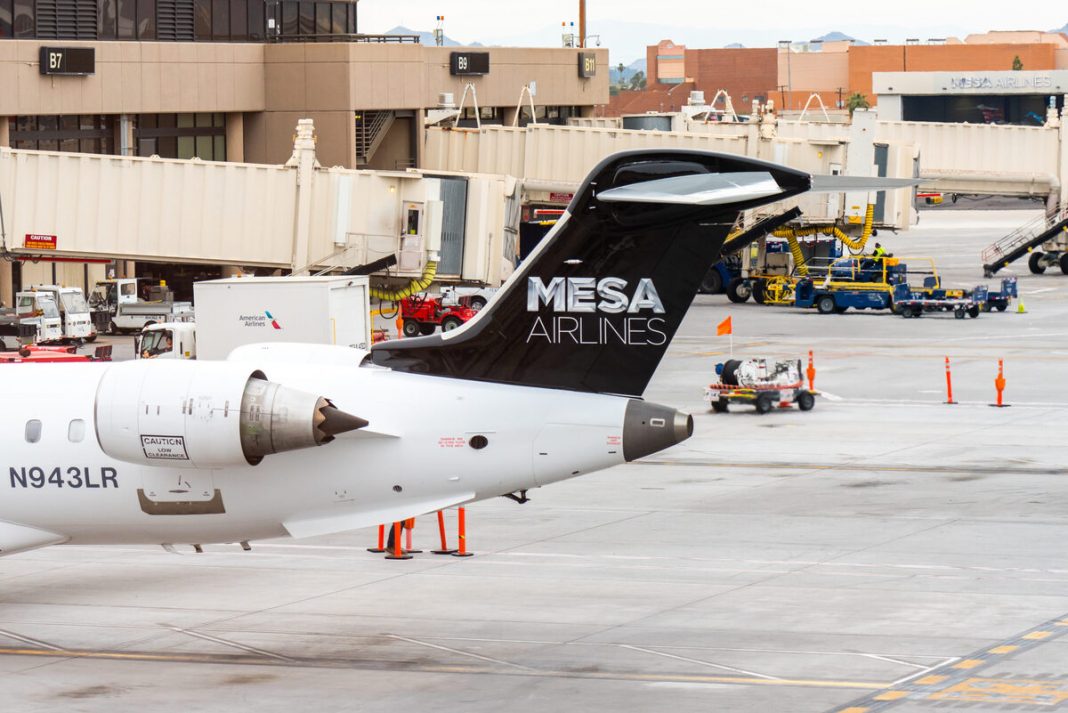Phoenix-based US regional carrier, Mesa Airlines, has reported a fourth-quarter and full-year profit for the 2020 fiscal year. The carrier, which flies on behalf of major US airlines to regional destinations, has posted some of the best results for an airline in the US in 2020.

Mesa’s financial highlights
Mesa Airlines, which ended its fiscal year on September 30th, 2020, recorded a net income of $11.375 million in the fourth quarter while recording a net income of $27.464 million for the fiscal year.
However, this was below the $47.580 million net income the airline recorded in the 2019 fiscal year. The airline attributed this to reduced flying due to the ongoing crisis, which meant reduced revenues.
Highlights from the year
Operationally, Mesa noted that it ran a 99.9% controllable completion factor. Total completion factor, including weather-related cancelations, close-in capacity reductions due to reduced demand, and other uncontrollable cancellations and flights, clocked in at 94.8%, which is still exceptionally high.

Jonathan Ornstein, Chairman and CEO, offered the following statement:
“Our industry was among the hardest hit by COVID-19 and the global impact that followed. Despite a significant reduction in flying, we were able to find creative ways to reduce costs, operate profitably, generate positive cash-flow, and protect our employees from involuntary furloughs. We also entered the cargo market through our new agreement with DHL – diversifying our revenue sources and creating new opportunities for our company. I can’t thank our hardworking employees enough, their dedication and professionalism truly went above and beyond this year.”
Its block hours for the year, Mesa Air flew the following:
- Q1 (October-December 2019): 115,562 hours
- Q2 (January 2020-March 2020): 108,305 hours
- Q3 (April 2020-June 2020): 31,622 hours
- Q4 (July 2020-September 2020): 57,622 hours
Mesa’s successful new agreements
In November, Mesa Airlines reached an agreement with American Airlines to operate 40 CRJ-900s for a five-year term. This is under the American Eagle banner.

This year, it commenced cargo operations for DHL using two Boeing 737-400Fs, which should be a reliable stream of revenue for the carrier moving forward.
Mesa also took 10 new Embraer E175 aircraft, which will fly for United Airlines under the United Express banner.
Lastly, Mesa also entered into a $195 million loan with the US treasury. It also did receive funds from the Payroll Support Program (PSP), which was a part of the early relief package for airlines.

What comes next for Mesa Airlines?
Mesa provided some guidance for the fiscal year of 2021. In the first quarter, which the airline is currently in, it is expecting to fly around 68,000 block hours, which is just more than what it flew in its fourth quarter. In early 2021, from January to March, Mesa expects to fly 73,000 block hours.
After facing the sharp drop-off in block hours in the third quarter, Mesa has steadily added more and more flying. There is some way to go before it gets closer to its 100,000+ block hours, which it will probably end up hitting in either the third or fourth quarter.

As a regional carrier, Mesa has been less impacted than major carriers by the crisis. With a reduction in travel demand, Mesa’s smaller jets have come in handy on several routes for airlines, ensuring that the carrier will continue to fly. Not to mention, the DHL agreement is a great thing for the carrier since cargo is in high demand right now. However, cargo right now only makes up a tiny portion of Mesa’s flying. It still relies heavily on regional jet flying.
The future is still uncertain. Despite news about a vaccine, until it becomes widespread and stay-at-home orders and lockdowns become rarer, airlines will still face some fluctuations in demand in various regions of the country. For now, however, Mesa appears to have a positive outlook.
What do you make of Mesa’s results? Let us know in the comments!
[ad_2]
Source link


